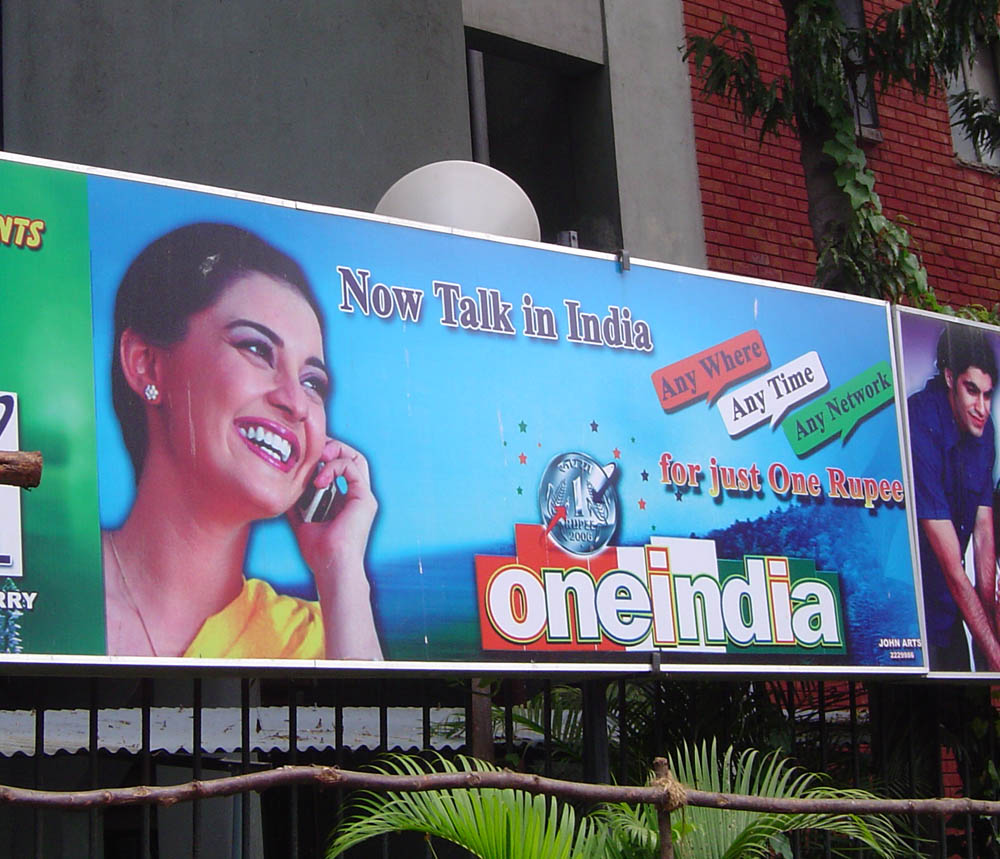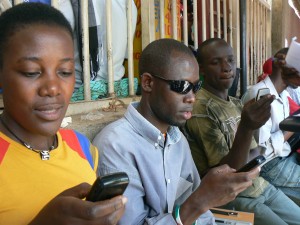em>Clare Salisbury has recently completed her MA in multimedia broadcast journalism at the University College Falmouth, Cornwall, UK, and this summer has been making a radio documentary on the impact which technology is having on administering aid in Africa. Clare is particularly interested in the ways that mobile and internet technology are influencing small scale farmers, food producers and NGOs. She recently met up with some FrontlineSMS users in Kenya, and in this guest post she shares some of her experiences.
“In the summer of 2011, I travelled to Kenya to make a multimedia documentary about the impact of mobile phone technology on farmers and NGOs that support them. Although I was prepared to see mobiles everywhere, driving from the airport into the city, I couldn’t believe the enormous billboards advertising mobile operators which lined the motorway. The next morning, I sat in a shopping mall in Nairobi and watched as people literally battled for space inside the nearest mobile phone store. People were even queuing to get in the door.
This is, of course, just another day in the capital. During my week in Kenya I would see that the real changes are happening in the hands of people based in rural areas. For these people, the possibilities opened up by access to a mobile handset are life changing.
Whilst in Nairobi I met John Cheburet who founded a radio programme in 2008 to complement the work of The Organic Farmer’s magazine and other outreach work. His programme focuses on agricultural techniques in a programme aired on two national radio stations.
John uses FrontlineSMS to manage the growing number of text messages he receives from the farmers who tune in every week. It’s a great tool as far as production goes; especially because he can send reminders to his listeners about upcoming programmes. John also admits that it’s a great way to think up content, for example– if he wants to make a programme on successful chicken farming techniques, he can easily find a farmer who’s working with chickens to interview by flicking through his SMS message inbox.
Click here to listen to John, of The Organic Farmer, speak about his use of FrontlineSMS.
Moreover, this feedback ensures his programmes are reactive to the opinions of the listeners which enriches his programme. ‘Farmers know things’, he told me, ‘for a radio programme to be interesting, there has to be a two way communication.’
But as I found out later in my trip, this conversation facilitated by FrontlineSMS is happening in more than just two directions. In Busia, a border town between Uganda and Kenya in the western region of the country, I met Emmanuel: a small scale dairy farmer who trains his peers and neighbors as part of the Send A Cow project.
He was carrying a copy of The Organic Farmer magazine. It turned out he never misses an installment of John’s radio programme on the Kenyan Broadcasting Corporation (KBC). I asked him whether he ever texts into the show. He said he does, and that through the programme, he has made contact with other small scale farmers across the country and exchanged many ideas and techniques.
Emmanuel had clearly been motivated by the success and potential of text messaging. He told me how he encourages all the farmers and he helps to train them to use SMS effectively. This encounter was fascinating and it showed me that whilst the concept of text messaging is a simple two way dialogue, combined with a powerful radio presence, the two way conversation is only the beginning. As John said to me back in Nairobi; when he is producing, he likes to imagine that as well as disseminating information on The Organic Farmer, he is really only contributing to a much bigger knowledge exchange throughout the farming community.
I learned during my trip that mobile phones are changing the future for the small scale farmers in Kenya. And the many potential benefits of mobile technology continue to be explored. Spending a day in Nairobi’s sophisticated iHub innovation space for the tech community offered me an enormously exciting insight into what mobile technology tools could be to come for farmers in Kenya and across Africa, too. As international infrastructure accelerates to accommodate the technology being developed, farmers in Africa are increasingly able to benefit.”
You can find Clare's full radio documentary, as well as more audio and photos from her trip on her website here: http://aidtwenty.wordpress.com/ If you are interested in the powerful combination of mobile and radio technologies check out our FrontlineSMS:Radio project website here: http://radio.frontlinesms.com/









